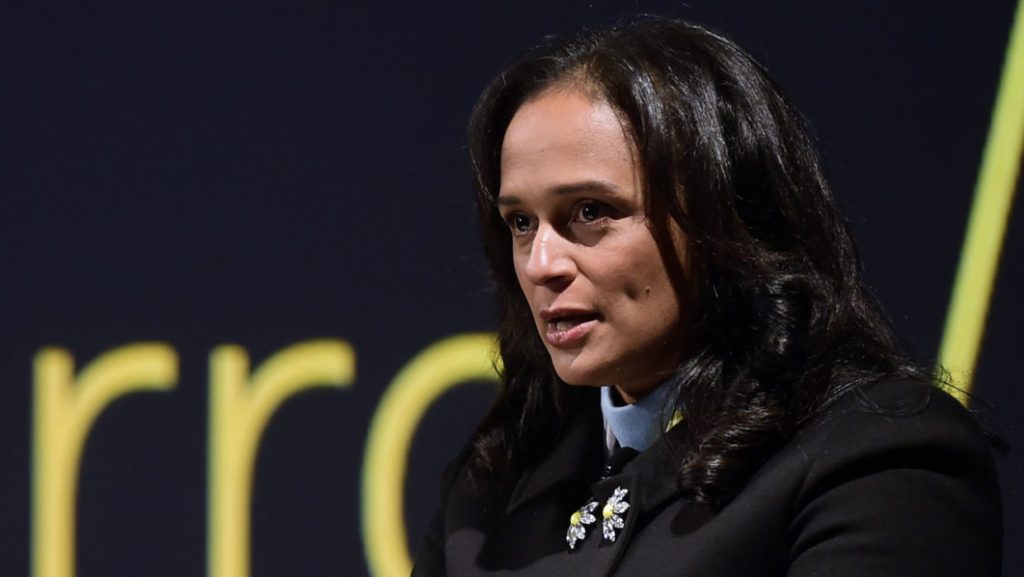UK sanctions Angola’s Isabel dos Santos in corruption crackdown
4 min read
The United Kingdom has imposed sanctions on Isabel dos Santos, Angola’s billionaire businesswoman and the daughter of the country’s former president, as part of a broader crackdown on money laundering. This move comes under the new Labour government’s pledge to tackle illicit financial activities. Along with dos Santos, two other high-profile figures—exiled Ukrainian oligarch Dmytro Firtash and one of Latvia’s wealthiest individuals, Aivars Lembergs—were also sanctioned.
The British government has labeled the three individuals as “notorious kleptocrats” and imposed measures including freezing their assets in the UK and instituting travel bans. These sanctions are intended to address what the government sees as the exploitation of public funds by individuals who have enriched themselves at the expense of their fellow citizens, depriving them of much-needed resources for education, healthcare, and infrastructure development.
Isabel dos Santos, who is often referred to as Africa’s first female billionaire, has been accused of using her powerful connections, particularly within Angola’s state oil company Sonangol and the telecommunications company Unitel, to siphon off at least $440 million in illicit funds. Her wealth, which spans a variety of industries from oil to telecommunications, has long been a subject of scrutiny, especially in light of her father, José Eduardo dos Santos, who ruled Angola for 38 years until his death in 2022.
The sanctions come after years of increasing pressure on dos Santos, especially following the change in leadership in Angola. When the country’s new president, João Lourenço, took office in 2017, he launched an anti-corruption campaign, which led to an investigation into Isabel dos Santos. Since then, she has faced numerous corruption charges across multiple countries, including Portugal, the United States, and Switzerland. British officials claim that dos Santos leveraged her position within state-run companies to embezzle large sums of money, which were then funneled into her own businesses and personal accounts.
Despite these allegations, dos Santos has consistently denied the charges, maintaining that she is the victim of a politically motivated attack. She argues that the accusations against her are part of a vendetta orchestrated by political opponents. In response to the UK sanctions, dos Santos has strongly criticized the decision, calling the measures “incorrect and unjustified.” She expressed frustration that she was not given an opportunity to present her case or defend herself before the sanctions were imposed. She has also announced her intention to appeal the sanctions, signaling a prolonged legal battle.
Dos Santos’s rise to wealth and power has been closely tied to her father’s presidency, during which she secured significant stakes in some of Angola’s most lucrative industries. Her business dealings have raised questions about the intersection of political power and business in Angola, where critics have long alleged that corruption is endemic within the country’s elite. Despite these controversies, Isabel dos Santos has maintained a prominent international profile, securing investments and business partnerships that have further solidified her position as one of Africa’s wealthiest women.
The sanctions on dos Santos are part of a wider push by the UK government to target individuals linked to corruption and money laundering. The move is seen as an effort to clean up the UK’s financial sector, which has long been criticized for facilitating the flow of illicit money into the country. Alongside dos Santos, Firtash and Lembergs have also been sanctioned for their roles in alleged corrupt activities in their respective countries. Firtash, a Ukrainian oligarch, has faced legal troubles related to bribery charges in the US, while Lembergs, a Latvian politician and businessman, has been involved in various corruption investigations in Latvia.
The UK’s actions highlight the growing international effort to hold high-profile individuals accountable for corruption and the misuse of public funds. By freezing assets and imposing travel bans, the government is signaling that those who engage in financial crimes will face serious consequences, no matter where they are located.
In addition to the political and legal challenges, dos Santos has also faced significant financial difficulties. Her business empire has been under increasing pressure, with many of her assets in Angola being targeted for seizure by the government. The sanctions from the UK could further complicate her ability to do business internationally, as she may face increasing isolation from global financial markets.
While dos Santos prepares to challenge the sanctions, the UK’s decision represents a significant step in its broader anti-corruption strategy. The outcome of her legal appeal could have broader implications for how the international community handles high-level corruption, especially in countries with a history of political elites using state resources for personal gain.






